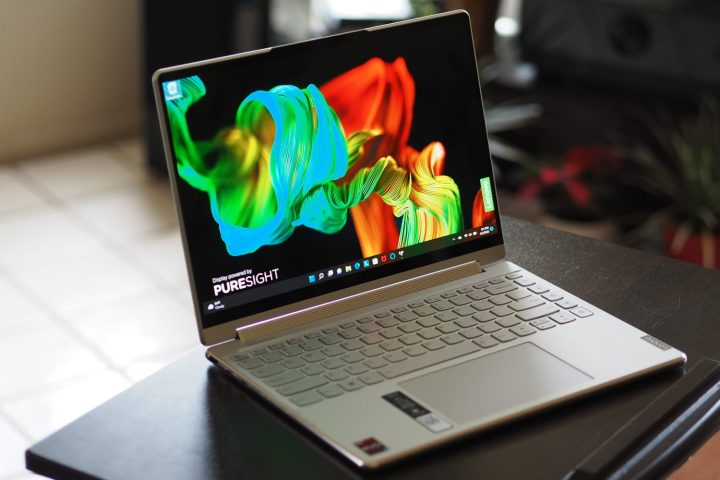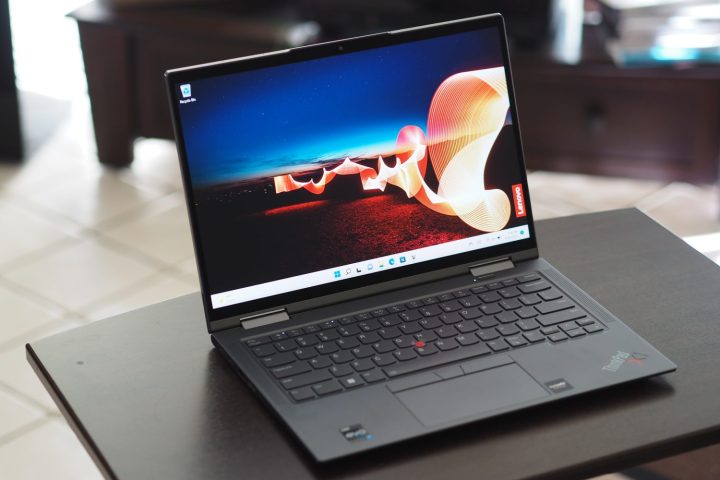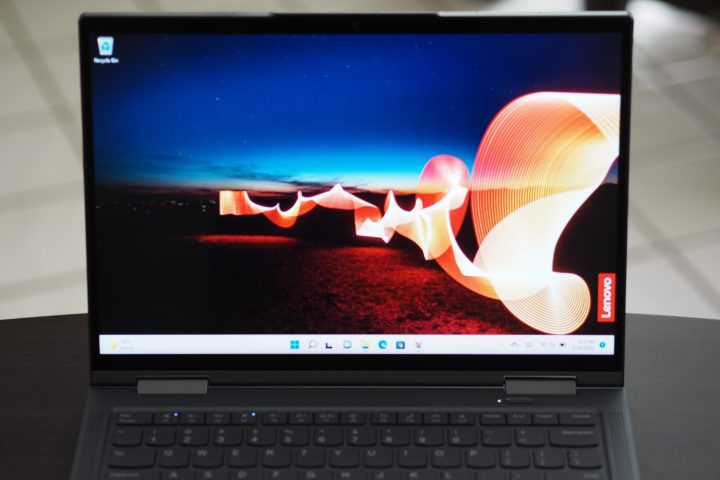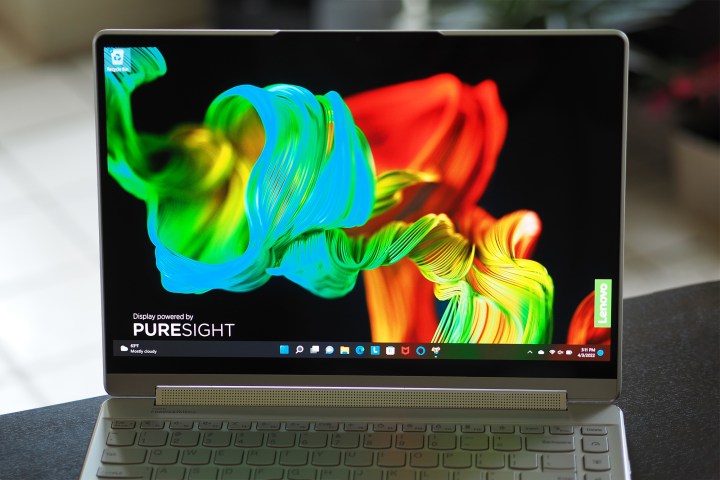Lenovo offers two excellent premium convertible 2-in-1s in the increasingly popular 14-inch laptop segment. The ThinkPad X1 Yoga Gen 7 is the latest in the company’s line of business-oriented 2-in-1s, while the Yoga 9i Gen 7 is a completely redesigned mainstream premium machine that’s on our list of best 2-in-1s.
Both laptops have their strengths and weaknesses, and they compete for the same users in many cases. Which 2-in-1 is the best?
- 1.
Lenovo Yoga 9i 14 Gen 7 - 2.
Lenovo ThinkPad X1 Yoga Gen 7
Specs
| Lenovo Yoga 9i Gen 7 | Lenovo ThinkPad X1 Yoga Gen 7 | |
| Dimensions | 12.52 inches by 9.06 inches by 0.6 inches | 12.38 inches x 8.75 inches x 0.61 inches |
| Weight | 3.09 pounds | 3.04 pounds |
| Processor | Intel Core i5-1240P Intel Core i7-1260P Intel Core i7-1280P |
Intel Core i5-1240P Intel Core i5-1250P with vPro Intel Core i7-1260P Intel Core i7-1270P with vPro |
| Graphics | Intel Iris Xe | Intel Iris Xe |
| RAM | 8GB LPDDR5 16GB LPDDR5 |
8GB LPDDR5 16GB LPDDR5 |
| Display | 14-inch 16:10 IPS WUXGA (1920 x 1200) 14-inch 16:10 OLED WQHD+ (2880 x 1800) 14-inch 16:10 OLED WQUXGA (3840 x 2400) |
14-inch 16:10 IPS WUXGA (1,920 x 1,200) anti-reflective 14-inch 16:10 IPS WUXGA (1,920 x 1,200) 14-inch 16:10 OLED WQUXGA (3,840 x 1,200) |
| Storage | 256GB PCI 4.0 SSD 512GB PCIe 4.0 SSD 1TB PCIe 4.0 SSD |
256GB PCIe 3.0 SSD 512GB PCIe 3.0 SSD 1TB PCIe 3.0 SSD 1GB PCIe 4.0 SSD |
| Touch | Yes | Yes |
| Ports | 1 x USB-C 3.2 Gen 2 2 x USB-C 4.0 with Thunderbolt 4 1 x USB-A 3.2 Gen 2 3.5mm audio jack |
2 x USB C with Thunderbolt 4 2 x USB-A 3.2 Gen 1 1 x HDMI 2.0b 3.5mm audio jack Optional Nano SIM slot |
| Wireless | Wi-Fi 6E and Bluetooth 5.2 | Wi-Fi 6E and Bluetooth 5.2 Optional 5G WWAN or 4G LTE |
| Webcam | 1080p with infrared camera for facial recognition | 1080p 1080p with infrared camera for facial recognition 1080p with infrared camera with Computer Vision |
| Operating system | Windows 11 | Windows 11 |
| Battery | 75 watt-hour | 57 watt-hour |
| Price | $1,450+ | $1,590+ |
| Rating | 4 out of 5 stars | 3.5 out of 4 stars |
Design

The Yoga 9i Gen 7 received a complete redesign, gaining rounded chrome edges along the chassis contrasted with slightly sharper edges along the lid. The 2-in-1 not only looks stunning, but it’s incredibly comfortable to hold in tablet mode. It’s a simple yet elegant design that makes it perhaps the best-looking convertible laptop around. The ThinkPad X1 Yoga Gen 7 retained its design from the previous version, when it gained the 2-in-1s redesign, including a switch to a 16:10 display. The ThinkPad is a minimalist design with simple lines and a rounded rear edge, with the usual ThinkPad red accents in the LED dot over the “i” on the lid, the logo on the palm rest, and the red TrackPoint nubbin in the center of the keyboard.
The display bezels are smaller on the Yoga, giving it a more modern appearance, and both laptops feature Lenovo’s reverse notch that houses the webcam and microphones. Overall, the Yoga 9i Gen 7 is the more striking design.
Both laptops are incredibly well built, with no bending, flexing, or twisting in the lid, keyboard deck, or chassis. That’s thanks to them both being constructed of CNC machine aluminum. The ThinkPad X1 Yoga Gen 7 was subjected to military tests for robustness, as with all ThinkPads. The hinges on both allow the lids to be opened with one hand while holding the display firmly in place in clamshell, tent, media, and tablet modes.
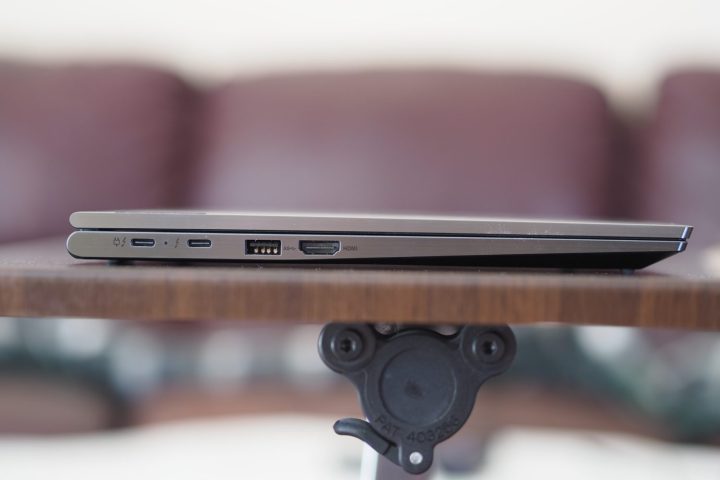
The ThinkPad provides better connectivity, with two USB-C ports with Thunderbolt 4 support, two USB-A 3.1 Gen 1 ports, a full-size HDMI 2.0b port, and a 3.5mm audio jack. The Yoga has two USB-C ports with Thunderbolt 4 support, a USB-C 3.2 Gen 2 port, a USB-A 3.2 Gen 2 port, and a 3.5mm audio jack. Neither 2-in-1 includes an SD card reader, which is disappointing. Both support Wi-Fi 6 and Bluetooth 5.2, and the ThinkPad adds 5G and 4G LTE WWAN options.
Privacy, security, and webcam
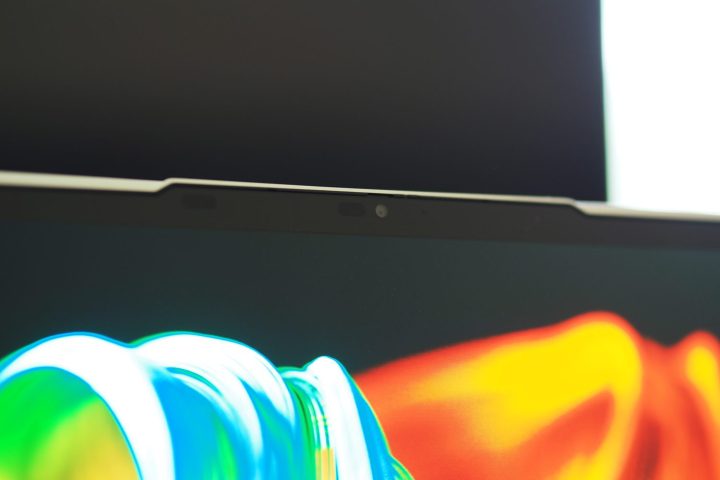
These laptops deserve a special section for privacy and security specifically, thanks to various features that make them two of the most secure and private laptops around. To begin with, they both offer 1080p webcams with security locks for high-quality video images, which is excellent for videoconferencing. The Yoga 9i Gen 7 includes an infrared camera for facial recognition by default, while the ThinkPad X1 Yoga Gen 7 has three different webcam options. There’s one without an infrared camera, one with a simple infrared camera, and one with what Lenovo calls “Computer Vision.”
The Yoga and the ThinkPad with the Computer vision IR camera both support the company’s Zero Touch Login and Zero Touch Lock feature, which can detect whether the user is present and either lock or wake up the laptop accordingly. On the Yoga, the Smart Assist utility can also start and stop video based on whether the user is looking at the screen. The ThinkPad’s Commercial Vantage utility can also mate with the included Glance app to let the user know when someone is looking over their shoulder.
Both laptops provide great webcams and extensive security and privacy features. The ThinkPad X1 Yoga Gen 7’s suite is a little more extensive.
Performance

Our review units equipped the Intel 12th-gen Core i7-1260P, a 28-watt CPU with 12 cores (four Performance and eight Efficient) and 16 threads. Both laptops performed well, but the ThinkPad X1 Yoga Gen 7 was more limited by thermal throttling than the Yoga 9i Gen 7 and thus had less performance headroom.
Looking at our benchmark results, the Yoga 9i was faster across the board, especially when both laptops were switched to perform mode. The performance tuning utility was more impactful with the Yoga 9i Gen 7, with its scores jumping considerably when switching from balanced mode. It took the lead in every benchmark, including the 3DMark Time Spy test.
Both laptops can handle demanding productivity tasks with ease. The Yoga 9i Gen 7, though, will be faster at CPU-intensive creative tasks. Neither laptop is suitable as a gaming machine.
| Lenovo Yoga 9i 14 Gen 7 (Core i7-1260P) |
Lenovo ThinkPad X1 Yoga Gen 7 (Core i7-1260P) |
|
| Geekbench 5 (single / multi) |
Bal: 1,717 / 9,231 Perf: 1,712 / 10,241 |
Bal: 1,650 / 8,080 Perf: 1,621 / 8,544 |
| Handbrake (seconds) |
Bal: 130 Perf: 101 |
Bal: 116 Perf: 120 |
| Cinebench R23 (single / multi) |
Bal: 1,626 / 7,210 Perf: 1,723 / 8,979 |
Bal: 1,587 / 7,682 Perf: 1,611 / 8,078 |
| PCMark 10 Complete | 5,760 | 5,537 |
| 3DMark Time Spy | Bal: 1,658 Perf: 1,979 |
Bal: 1,899 Perf: 1,886 |
Display
- 1.
Lenovo ThinkPad X1 Yoga Gen 7 - 2.
Lenovo Yoga 9i 14 Gen 7
We reviewed the Yoga 9i Gen 7 with its WQHD+ OLED display, which was bright, sharp, colorful, accurate, and enjoyed OLED’s inky blacks. The ThinkPad’s lower-res IPS panel was also bright, offered better-than-average colors and accuracy, and a stunningly deep contrast ratio for an IPS display. Both are excellent displays for their technologies, but the Yoga still wins this category.
| Lenovo Yoga 9i 14 Gen 7 (OLED) |
Lenovo ThinkPad X1 Yoga Gen 7 (IPS) |
|
| Brightness (nits) |
406 | 386 |
| AdobeRGB gamut | 95 | 81% |
| sRGB gamut | 100 | 100% |
| Accuracy (DeltaE, lower is better) |
0.87 | 0.78 |
| Contrast ratio | 28,380:1 | 1,900:1 |
Portability

The two convertible 2-in-1s are almost exactly the same size, with at most a quarter of an inch separating them in width and depth. They’re essentially equally thin and light, with the Yoga 9i Gen 7 coming in at 0.61 inches and 3.09 pounds and the Thinkpad X1 Yoga Gen 7 at 0.6 inches and 3.04 pounds. You won’t notice the difference between these machines unless you pull out a ruler and a precise scale.
Battery life is a slightly different story. The Yoga 9i has 75 watt-hours of battery capacity compared to the ThinkPad at 57 watt-hours, but our review unit equipped a power-hungry high-res OLED display compared to the Thinkpad’s low-power, lower-resolution panel. Therefore, while the Yoga saw less battery life than the ThinkPad, the display accounts for most of the difference. Equip the Yoga with a low-res display of its own, and it likely matches the ThinkPad.
Both laptops will last a full day of productive work, but the Yoga 9i Gen 7 is more impressive given its voracious display.
| Lenovo Yoga 9i 14 Gen 7 (Core i7-1260P) |
Lenovo ThinkPad X1 Yoga Gen 7 (Core i7-1260P |
|
| Web browsing | 9 hours 10 minutes | 10 hours, 10 minutes |
| Video | 12 hours 45 minutes | 16 hours, 12 minutes |
The Yoga 9i Gen 7 is the more attractive and comfortable 2-in-1
Right now, Lenovo lists three configurations for the Yoga 9i Gen 7. At the low end is a $1,600 option with a Core i7-1260P, 16GB of LPDDR5 RAM, a 512GB PCIe 4.0 SSD, and a 14-inch WUXGA (1,920 x 1,200) IPS display. At the high end is a $1,750 configuration with a Core i7-1260P, 16GB of LPDDR5 RAM, a 512GB PCIe 4.0 SSD, and a 14-inch WQUXGA (3,840 x 2,400) OLED display.
The ThinkPad X1 Yoga Gen 7 starts at $1,590 for a Core i5-1240P, 8GB of LPDDR5 RAM, a 256GB PCIe 4.0 SSD, and a 14-inch WUXGA IPS display. Maxed out, the 2-in-1 costs $2,577 for a Core i7-1270P with vPro, 32GB of LPDDR5 RAM, a 1TB PCIe 4.0 SSD, and a WQUXGA OLED display.
These two convertible 2-in-1s are neck and neck, with the Yoga 9i Gen 7 being faster and better looking and the ThinkPad X1 Yoga Gen 7 offering more business-oriented features. The ThinkPad is more expensive, however, and the Yoga is by far the more stunning device. It wins this shootout.
Editors’ Recommendations


